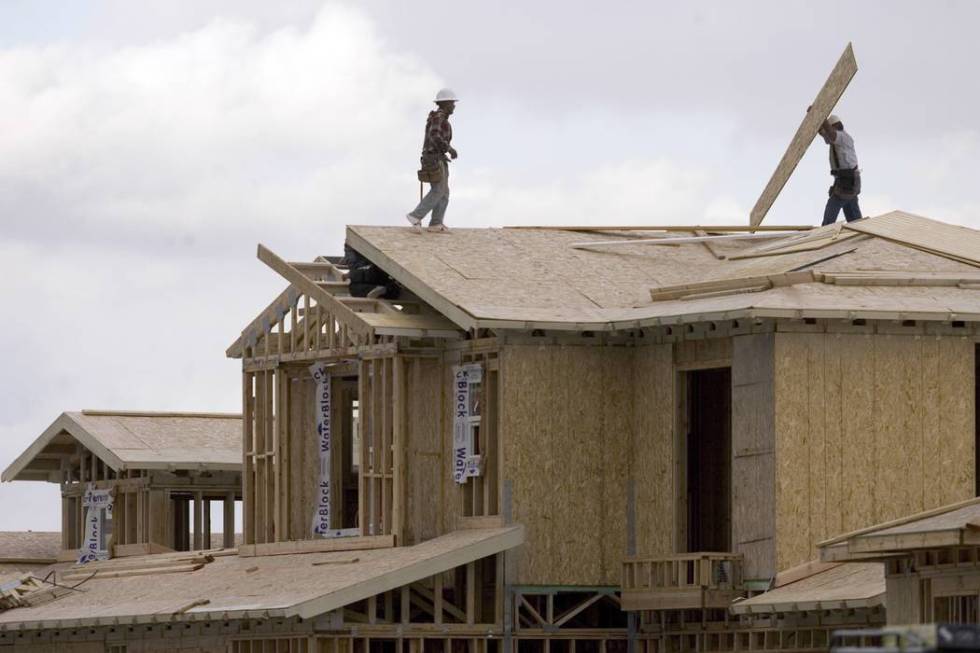Nevada’s real estate industry blamed wrong enemy when bubble burst

Las Vegas’ economy is on strong footing today, but in early 2015 it was still climbing out from the dark days of the recession.
The valley was still flooded with underwater houses, Nevada had one of the highest foreclosure rates in the country, homebuilders’ sales in Las Vegas remained a fraction of their bloated, bubble-era peak, and squatters were taking over vacant homes across the valley.
Nevada’s real estate industry, ignoring its wobbly legs, blamed the plunge in new-home sales on a different enemy: construction defect litigation. And Republicans controlling the state Legislature at the time were more than happy to help.
State lawmakers approved a bill in 2015 — a decade after Las Vegas’ wild building spree — that raised barriers to pursuing lawsuits alleging shoddy construction. A measure now working its way through the Democratic-controlled Legislature would wipe out or change provisions of that law.
Backed by attorneys, Assembly Bill 421 would make it easier for homeowners to pursue construction defect claims — and potential lawsuits — against builders, contractors and others who worked on their homes.
Amid the back-and-forth, here’s a look at the 2015 law now in Democrats’ crosshairs, and its supporters arguments at the time.
The measure, Assembly Bill 125, was introduced in February 2015 and signed into law a few weeks later. It changed the definition of a constructional defect by stripping out “in violation of local codes or ordinances,” and required homeowners to report defects “in specific detail” with “exact” locations.
It barred homeowners from sending construction defect notices to builders unless they had submitted a claim under their homeowner’s warranty and the insurer had denied it. And the bill slashed the time limit on pursuing a construction defect case from up to 10 years after the work was finished, to six years.
In letters to lawmakers, supporters said construction defect lawsuits were vastly more common in Nevada than in other states, were a big money maker for lawyers, and pushed up builders’ and contractors’ insurance and legal costs.
They also pointed to Las Vegas’ HOA scandal, a conspiracy with dozens of defendants who set out to take over homeowners association boards last decade and defraud them through construction defect litigation and repair work.
Plus, they argued that construction defect cases were strangling the housing market.
“We take great pride in crafting homes that will bring years of enjoyment and memories to homebuyers,” Bill Miles, president of the group then known as the Builders Alliance of Western Nevada, said in a letter. “But it’s getting harder and harder for people achieve (sic) that dream in Nevada. Why? Because serious abuse of our state’s law on construction defects has practically halted new home starts.”
Brad Spires, legislative chair at Nevada Association of Realtors, wrote that AB125 “could remove one of the biggest blocks keeping the housing industry from reaching its growth potential.”
The Nevada Home Builders Association said the bill was “an essential opportunity” to “revitalize the still-sluggish housing industry” and “create jobs.” Between 2006 and 2012, construction defect lawsuits soared by 355 percent as new-home development dropped by 86 percent, the group said.
“These figures give Nevada the dubious distinction of having the worst construction defect environment in the country,” association co-chairs Jesse Haw and Rob McGibney wrote in the letter.
But those arguments ignored the reality of Southern Nevada’s boom and bust.
Fueled by easy money for buyers and builders, construction went into hyperdrive in the mid-2000s. But when the bubble burst, Las Vegas’ real estate market was perhaps the hardest-hit in the country as job losses soared, foreclosures swept through the valley and numerous projects were abandoned.
The resale market was flooded with low-priced homes – many of them probably not too old – giving buyers little incentive to purchase a pricier new one from a builder. Even if they wanted a newly built house, getting a mortgage would have been difficult, if not impossible, for many buyers, given all the short sales, foreclosures and bankruptcies that locals went through.
There’s no reason to believe the real estate industry is somehow immune to frivolous construction defect lawsuits or other ridiculous litigation. All industries are prone to senseless, costly lawsuits.
But builders’ sales evaporated because the market crashed face-first in the pavement.
Contact Eli Segall at esegall@reviewjournal.com or 702-383-0342. Follow @eli_segall on Twitter.